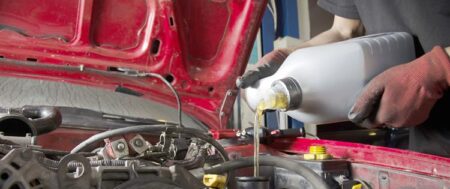1. What type of noise is happening when you turn your vehicle?
At the end of the day, your car should not be making much sound when you drive, especially when you’re turning.
But, as we discussed in our last article about diagnosing car not starting noises, not all noises mean the same thing. Even though we’re talking specifically about noises that cars make while turning, the pitch, movement, and frequency of the noise can point to completely different causes.
Squeaking, squealing or whining
If you turn the steering wheel and are immediately met with an alarming squealing noise, this could be a symptom of low power-steering fluid. Power-steering fluid is an important part of your power steering system. It is the lubricant that keeps the link between your steering wheel and front wheel running smoothly. It also extends the life of the moving parts in your system by preventing corrosion or abrasion.
When your fluid is running low or needs to be changed, you might also notice that you need more force when trying to turn the wheel. Generally power steering fluid needs to be changed every five years or 50,000 miles however, if you’re low on fluid, you could have a leak.
Clunking, popping and creaking
If you’re hearing any of these more mechanical noises like a clunking sound, you might be dealing with suspension system issues. Your vehicle suspension system is the buffer between your car frame and the pavement. The point of the suspension system is to maximize the friction between your tires and the road. This creates stability while steering absorbs bumps/shock, and makes you and your passengers more comfortable.
As your vehicle gets older (or you drive on a lot of unmaintained roads), your suspension system will have some wear and tear. This could be as simple as loose nuts or more complicated like shrunken rubber bushing or leaking shocks or struts. A creaking noise around corners is often a signal of a worn ball joint. This could also be accompanied by a knocking noise when you go over bumps.
Rotational Noises
If your vehicle is making a noise that sounds like a playing card in bicycle spokes, this could be a sign that your wheel bearings are starting to go. Your wheel bearings are the small metal balls (or rollers) within small rings that are designed to reduce friction and allow vehicle wheels to spin freely. They are located in the wheel hub, which is the part responsible for connecting the wheel to each axle.
How wheel bearings work.
Think about it this way: what causes more friction, a ball rolling on a surface or a cube rolling on a surface?
A typical ball bearing reduces friction in the wheel hub with small metal balls that roll between two smooth rings of metals. Note: the two most common types of wheel bearings are ball bearings or roller bearings, both of which work with the same process.
When the bearings become warped or otherwise start to fail, the friction in your wheel hub begins to increase, resulting in this rotational noise, hum, or other vibration. If left unchecked, a bad bearing will cause the wheel to wobble and can cause the axle to seize and lock. While a failing bearing can be extremely dangerous it is also not an expensive repair. If you’re concerned about a potentially failing bearing, please don’t hesitate to bring it into the shop.
2. What side of the vehicle is the noise coming from?
The most important part of identifying where the noise is coming from is to remember that turning side doesn’t mean location. Just because a noise happens when you turn in a direction, doesn’t mean that the source of the problem is on that specific side of your vehicle.
This is because turning your vehicle changes the position of the load: if you’re turning left, your right tire/wheel/CV joint is also turning left. The load is shifting and therefore reveals if any of your supports are starting to fail.
If you think the noise is only coming from one specific area of the vehicle, you can do a few physical checks to confirm. For instance, if you swear you only hear the noise from the front passenger side tire, you can try to recreate the noise by rocking your tire back and forth.
If you can recreate the sound by rocking the tire, you can confirm the general location of the noise. This makes it easier to explain the issue when you bring your car back into the shop.
That being said, harmonics are a huge factor. A noise can sound completely different or have a different location depending on whether or not you’re testing on the road or in a garage, so do keep that in mind.
3. What is prompting the noise?
Yes, I know we’re talking about noises that happen specifically when your car is turning but is it happening any other time?
Does your car only make noise when turning right but not left? Is it happening when you break?
Sometimes our clients will only notice a noise when they’re driving, however, the noise itself can be prompted while the car is also in park. We see this often when clients think they have a steering issue. Once we bring the car into the shop, we’re often able to recreate the noise while the car is stationary. This is a good sign the issue is not the steering wheel/column/system as it isn’t engaged when parked.
Another factor is the speed at which the noise occurs. If the noise is only happening at highway speeds, this is an indication of a bearing issue. This is because the inertia of highway speeds causes more pressure on the bearing and would prompt that noise.
Once again, your vehicle shouldn’t really be making any unusual noises when you’re driving. If you’re in Edmonton and hearing some alarming sounds from your car, give the shop a call and we’ll get to the bottom of things.




